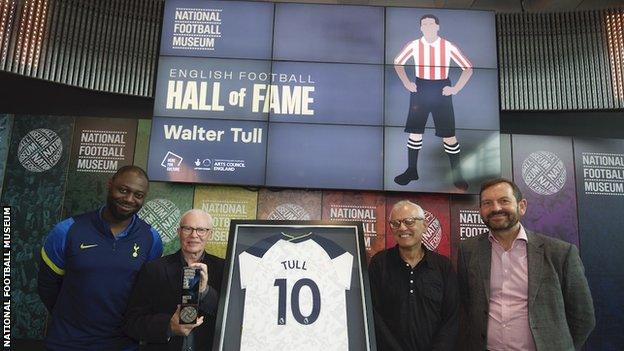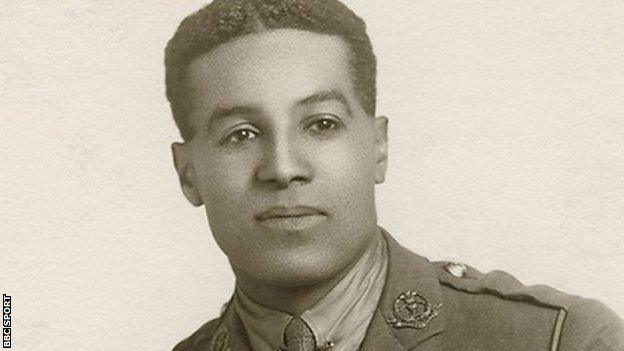Walter Tull: Pioneering black player inducted into National Football Museum Hall of Fame
- Published

Former Tottenham defender Ledley King (left) and Edward Finlayson (second left) at the ceremony inducting Walter Tull into the National Football Museum's Hall of Fame
Walter Tull, one of English football's first black players, has been posthumously inducted into the National Football Museum's Hall of Fame.
Tull signed for Tottenham in 1909 before moving to Northampton Town two years later.
He played more than 100 games for the Cobblers between 1911 and 1914 before dying aged 29 during World War One.
"As a family we are absolutely delighted on behalf of Walter," said Tull's great-nephew Edward Finlayson.
Tull was subjected to racist abuse during his football career before enlisting with Middlesex Regiment, part of a 'Footballers' Battalion' that recruited professional players from clubs after the outbreak of World War One.
He became Britain's first black army officer to command white troops, and was recommended for a Military Cross - a medal for gallantry - but did not get to receive it as he was shot on the battlefields of France.

Walter Tull made 10 appearances for Tottenham before spending three seasons at Northampton
"What matters to us as a family is the manner in which Walter's life is remembered - it seems to provide the possibility of hope against adversity and tackling discrimination and inequality," added Finlayson.
"Walter had to overcome many obstacles in his life. Walter might be disappointed that more progress has not been made, that we still face significant challenges. There is no place for complacency and that's a sad truth."
Former Tottenham defender Ledley King said: "Ever since I found out about Walter Tull as a young player at Spurs I've been a big fan. To see him inducted into the Hall of Fame is great.
"He is a true inspiration to me and a pioneer for every black footballer who has come through since.
"It's sad we are still going through the same issues now. It is improving, we are coming together. The changing room is more together now on these issues."

Our coverage of your Premier League club is bigger and better than ever before - follow your team and sign up for notifications in the BBC Sport app to make sure you never miss a moment
